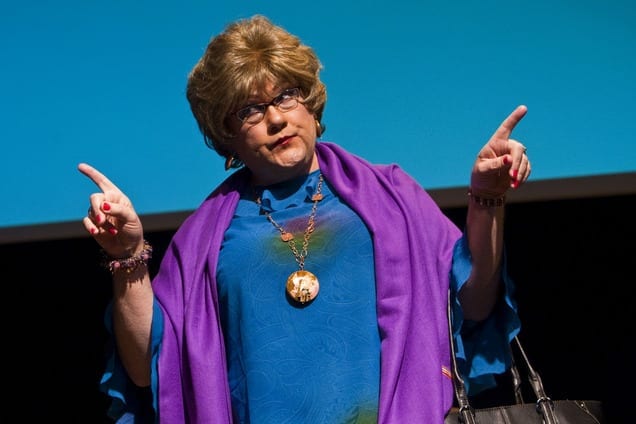 SALT LAKE CITY — The Salt Lake Acting Company Theater is a cozy but comfortable building just five blocks north of Temple Square in Salt Lake City. It sits on a hill across the street from an elementary school in a handsome little neighborhood. Inside, the theatre evokes a sense of memory and longevity, leading me to wonder all the uses this building has had over the years; the stories the walls could tell as they’ve watched many residents.
SALT LAKE CITY — The Salt Lake Acting Company Theater is a cozy but comfortable building just five blocks north of Temple Square in Salt Lake City. It sits on a hill across the street from an elementary school in a handsome little neighborhood. Inside, the theatre evokes a sense of memory and longevity, leading me to wonder all the uses this building has had over the years; the stories the walls could tell as they’ve watched many residents.
It wasn’t long into the performance of Dottie—The Sister Lives On! that I understood the sort of evening I was going into. I felt sheepish to discover the piece is a continuation of Dottie S. Dixon’s story, as I hadn’t realized I was sitting down for a sequel. Silly of me since it is evident in the title, but my absence of the original work had little effect on my understanding or appreciation of the character or her journey in this particular show.
Sister Dottie S. Dixon is a delightful, albeit complex, woman. Her essence is vibrant, gregarious, jovial and ever humorous. But beneath the wit there also lies a staunch spirit and distinctive perspective on the human condition. The play had no fourth wall and the character frequently interacted with the audience. She tells old friends of where her life has been: she describes being a Mormon gay rights activist living in Spanish Fork; the homosexual son by whom Dottie is inspired to speak out for equal marriage; the relationships Dottie has with her neighbors, her handsome cowboy husband, and her best friend Sister Dartsy Foxmorland; and how her unique combination of beliefs affect those relationships. Her best friend Dartsy happened to be the pianist for Dottie’s storytelling and the only other performer on stage.
Let it suffice to say that Dottie had me at “Hello.” From the beginning to the end, Charles Lynn Frost gave a performance as Dottie that pulled me into Dottie’s world and made me want to stay right there in her world. Frost’s performance included a great clarity of character, objective driven storytelling, and a sense of reality that brought great richness to the piece. It would be easy to allow a character like Dottie to become all shtick with no earthiness, but Frost accomplished quite the opposite with her. The moments of jocularity were a mere bonus to a story about a very real and grounded woman.
The writing of the piece, also primarily Charles Lynn Frost, in collaboration with Christopher R. Wixom, was on the whole very well structured and composed. As previously mentioned, I was new to Sister Dixon’s story, but this piece’s structure was inviting for new and old fans—there was a small, unassuming section of “catch up” for newbies, and the oldies were treated like long lost friends. In relation to writing, some moments of the play spoke to me less than others. One moment specifically was about Sister Dottie moving through the jungle while on vacation only to find the great phallic structure of the Aztecs. I believe this section was meant for comedic effect more than anything, but it was simply overwrought and overwritten.
The show’s external elements, direction, design, production, all served the piece well. I felt the production team had done the story justice by simply creating an atmosphere that supported Dottie’s needs. The technical elements were simply enriching instead of overbearing. The lighting design by James M. Craig was particularly successful in this notion. The addition of projections was clever in it’s incorporation—created by Lauren Ball, David Daniels, and Frank Feldman.
The director, Robin Wilks-Dunn, also served the story by using all the unique architecture Keven Myhre’s set design offered in a motivated way. I’m sure Wilks-Dunn is also to be credited for the great shape the piece had and the variance of colors and moods Frost and Wilks-Dunn were able to discover. The ups and downs of the show flowed nicely and naturally while still giving me a broad understanding of Dottie’s character.
Naturally, this isn’t a production for everyone. The moral of the story is that gay marriage ought to be legalized in Utah. It’s direct, poignant, and makes no apologies for that statement. So obviously not everyone is going to walk away in complete agreement with the viewpoint that is presented, but everyone will walk away having analyzed their own opinions again—an endeavor always worth pursuing. Some attitudes may be changed; some may be reinforced in their previous belief. Either way, give yourself the opportunity to think about equal rights again as told from the perspective of a unique woman who feels caught between two worlds. And if nothing else, you will chuckle once or twice.
Thus, in regard to the overall quality of the production, the audience said it all when Sister Dixon received an enthusiastic standing ovation. Well-written, well performed, well directed, the show upheld the standards we all have of the Salt Lake Acting Company.
[box type=”shadow”]Dottie—The Sister Lives On! plays at Salt Lake Acting Company (168 W. 500 N., Salt Lake City) Wednesdays through Saturdays at 7:30 PM and Sundays at 1 and 6 PM through March 4. Tickets are $15-38. For more information, visit saltlakeactingcompany.org.[/box]

